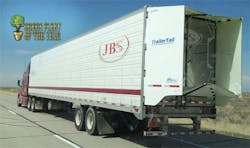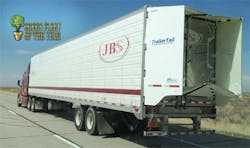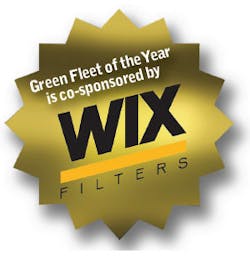With everything we know about fuel efficiency these days, it’s tough to find a fleet that isn’t doing something to reduce fuel usage and lower greenhouse gas emissions. Be it to boost the bottom line, to create a “greener” perception of the fleet, or just to be a better corporate citizen, most carriers are implementing some device or training technique designed to cut fuel use.
From side skirts to fuel-efficient tractors and everything in between, fleets are willingly testing and implementing devices when they can. For some fleets, though, the cost of installing a device that might only provide a 1% fuel efficiency gain could be a deal-breaker.
There are other fleets, however varied their equipment might be, that see each 1% as something to gain, a little more profit during times when profit margins are slim. Some fleets also see improved driver morale and retention as a result of these initiatives. JBS Carriers is one of those fleets.
All of the initiatives at JBS, which include side skirts, TrailerTails, auxiliary power units (APU) and driver training to name a few, are designed to both increase fuel efficiency and create a positive experience for drivers.
“One of [President Rodrigo Horvath’s goals upon taking over] was really to optimize the fleet…to improve the fleet and attract drivers,” says Cameron Bruett, sustainability-corporate communications for JBS. “We’re having record lows in [driver] turnover,” adds Horvath. “It’s hard to say what any individual effort has done [to contribute to that], but it’s all part of the [fleet] image.”
For its efforts, JBS Carriers is Fleet Owner’s 2013 Green Fleet of the Year.
JBS Carriers is a 48-state truckload carrier hauling a variety of items, from refrigerated meats to cattle and even some bulk liquids. The carrier has a regional division as well, operating in some Midwest and Western states near its home base in Greeley, CO. The fleet has terminals in Greeley as well as Green Bay, WI; Hyrum, UT; Cactus, TX; and Pittsburg, TX. There is also a growing logistics operation based in Gainesville, GA.
The trucking fleet is part of JBS Companies, which is said to be the largest animal protein processor in the world. JBS Companies produces a variety of products, including food, leather, pet products, and biodiesel. It has production and processing plants in Brazil, Argentina, Italy, Australia, U.S., Uruguay, Paraguay, Mexico, China, and Russia.
INDIVIDUAL APPROACH
JBS Carriers started as the private fleet for the company years ago, but has since grown into a diversified carrier with only about half of its revenue coming from JBS Companies’ contracts, which the carrier must bid on. Because of its diversity, though, creating a single “green strategy” that works across all divisions is not feasible.
“You need to approach each division separately. I like cattle haul, but the issues that fleet faces on a daily basis are different than those of over the road. So you have to approach each differently,” says Horvath.
One initiative that has really paid off in a big way for JBS is the installation of APUs. Once JBS began testing the Dynasys APU on its sleepers last year, the benefits of the heating and cooling unit quickly became evident.
“It gives [drivers] an opportunity to have a better environment, both in cold weather and in hot,” says Horvath. “Our idle time has come down from the high 40% [range] to the low 30% [range].”
JBS can probably expect to see that rate continue to fall as only 267 tractors are currently equipped with the Dynasys APU. A mix of Kenworth and Peterbilt sleepers and day cabs make up the 760-tractor fleet. Trailer units, which number about 1,100, include tankers, container chassis, cattle haulers, and refrigerated vans.
Cedar Park, TX-based Hodyon, which produces the Dynasys APU, says carriers can expect to see significant savings when using the system. JBS took advantage of a no-risk trial offer from the company to test the units. Originally outfitted in 16 tractors, JBS saw a 16% fuel economy gain on the test units, says Hodyon, resulting in improvement from 6.04 to 6.99 mpg. That is a fuel savings of more than $181 per week and $9,417 per year, per truck based on a fuel cost of $3.80/gal., points out Hodyon.
The typical over-the-road JBS tractor-trailer runs about 100,000 mi./year, resulting in a return on investment for the $8,500 APU of just 11 months, says Hodyon.
The APU test included measuring mpg prior to installation of the device and then monitoring the vehicles through the onboard ECU and Qualcomm OmniTracs system over 10 weeks once the APU was installed. Every one of the 16 test vehicles showed an improvement post-install, says Hodyon, with four tractors obtaining more than 7 mpg and six within tenths of a percentage point of that mark.
Prior to the purchase of the Dynasys units, JBS had no idle restrictions in place, says Bruett. One tractor saw its idle percentage drop from nearly 70% to about 20%, with 14 of the remaining 15 test vehicles dropping below 10% and, in many cases, dropping into the low single digits, says Hodyon.
“The APUs go to driver well-being,” points out Bruett, “showing that you care about the driver as much as the cargo you’re shipping.”
SKIRTS AND TAILS
As a SmartWay carrier, JBS continues to look for ways to further reduce fuel usage. That has resulted in a number of other initiatives, Horvath says. With most of its trailers skirted, JBS has now installed TrailerTail devices from ATDynamics, Hayward, CA, on 140 trailers as part of a test. “We’re testing those TrailerTails in Utah,” says Horvath. “We’re seeing anywhere from a 1% to 3% improvement. We are already satisfied with the test [results].”
Horvath points out that while JBS is seeing reason to install the devices on its fleet of trailers, the practicality of doing so makes it tougher to accomplish quickly. “We drop and move trailers everywhere … but the results are there.”
The company’s trailer skirts are also from ATDynamics. All new trailers are spec’d with the skirts, Horvath says. JBS began installing the skirts about four years ago, in part to address California regulations that require all trailers 53 ft. or longer operating in the state to use skirts and low-rolling resistance tires.
“When it comes to the California regulations, it’s fair to say it helped in our decision, but we were already going in that direction,” says Bruett.
ATDynamics says its side skirts produce a fuel savings of between 4% and 7%, saving an estimated 7 to 8 gals. of fuel per 1,000 mi. traveled at highway speed. Like many fleets, JBS also runs low-rolling resistance tires, with its tire of choice being Bridgestone. The fleet has seen about a 1% improvement due to tires alone, says Horvath.
JBS has also seen significant improvement in fuel usage, thanks to the utilization of a fuel optimization software program.
About two years ago, the carrier implemented IDSC ExpertFuel from TMW Systems. “It’s a fuel solution that chooses the best route based on mileage and fuel price,” says Horvath. “We normally stay at 5%, 6% below the Dept. of Energy’s index [for fuel average].”
IDSC ExpertFuel generates a fueling strategy for each truck based on the route. According to TMW, the solution determines trip origin and destination from integration with the fleet’s dispatch system. It computes the shortest or most practical truck-safe route by taking into account distance, time and even toll costs.
Once the route is set, it takes the truck’s starting fuel level provided by the driver, negotiated network discounts and daily fuel pricing nationwide, and driver and company preferences to build an optimized fuel purchase plan. The fuel purchase plan for the trip is then dispatched to the driver in the cab.
In addition, JBS conducts quarterly driver training to ensure that new drivers are up to speed on company procedures, and veteran drivers receive reminders on fuel-efficient driving.
“In our orientations and when we bring drivers in, we have [lessons] on the best way to shift gears and the best way to use cruise control,” Horvath points out. One way JBS is getting a buy-in from drivers is through quarterly mpg bonuses. Because JBS Carriers has multiple divisions running different types of routes, it’s impossible to compare drivers across divisions, but within each unit, the bonus has proven effective.
“It’s based on fuel optimization compliance,” Horvath says. “The fuel optimizer tells you the route you go and the mileage and fuel you should use. Of course, drivers have a choice.”
The bonus is paid based on both mpg and percentage below the projected level according to the program. “As with any other fleet, our first priority is safety,” Horvath says. “We want our drivers to go off on a load and come back home. Most of these initiatives have safety as one of the benefits.” While most of these initiatives are not new to many in the industry, JBS is proving that a combination of small gains can add up to big savings.


